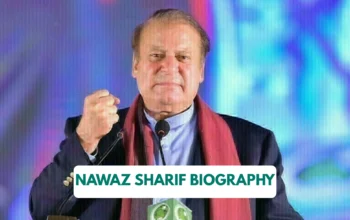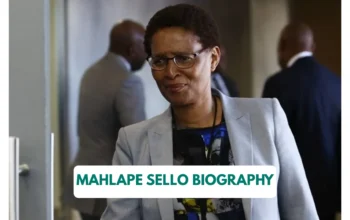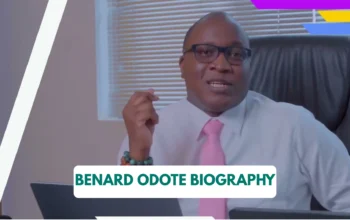Who is Ashley Sauls?
Ashley Sauls is a contemporary South African politician and public figure known for his outspoken advocacy for social justice, representation of marginalized communities, and his roles within local and national government.
Over the years, Sauls has transitioned from grassroots activism to significant positions such as municipal leadership and membership in the national assembly.
His story reflects a broader narrative of identity, representation, and political evolution in post-apartheid South Africa.
Bio Data
- Full Name: Ashley Qhoeke Sauls I
- Born / Birthplace: Born in Kliptown, South Africa
- Nationality: South African
- Occupation: Politician, Member of Parliament (MP), Whip for the Patriotic Alliance (PA)
- Tribe / Heritage: Belongs to the Komani San (Boesman) community of the westelike N//nte branch.
- Age: Reportedly about 45 years as of 2025.
- Religion / Beliefs: Christian — his faith is often referenced in public-life contexts.
- Marital Status / Spouse: Married; the identity of his spouse is not publicly confirmed / disclosed.
Early Life & Heritage
Sauls was reportedly born and raised in Kliptown, a historically significant region in South Africa, and spent parts of his upbringing in areas such as Klipspruit and Eldorado Park.
He identifies as a member of the Komani San (also described in some sources as “Boesman” heritage), reflecting a deep-rooted indigenous lineage — a background that shapes much of his political and social worldview.
This heritage, combined with early life in historically marginalized communities, appears to have solidified his commitment to representation, social justice, and giving voice to underrepresented populations.
Political Rise and Career
From Local Governance to National Stage
Sauls’ political career began at the local-government level. He held several key roles in municipal governance, including: being a Member of the Mayoral Committee (MMC) for Health and Transport, serving as Section 79 Chairperson for Finance, and at a point — acting as Executive Mayor of Johannesburg.
Later, he also served as Executive Mayor of Beaufort West Municipality in the Western Cape.
These roles afforded him considerable responsibility over public services, municipal budgets, and social infrastructure — building a reputation as someone familiar with governance, accountability, and grassroots concerns.
Parliamentary Role & Party Leadership
Today, Ashley Sauls holds key national-level positions. He is part of Patriotic Alliance (PA), serving as the Deputy Provincial Chairperson for the Western Cape and the Parliamentary Party Leader.
In Parliament’s national assembly, Sauls uses his platform to spotlight issues related to identity, representation of historically marginalized groups (particularly the San/Khoi-San and Coloured communities), and national debates on race classification, citizenship, and social justice.
His political narrative also intersects with activism: for many, he is more than just a politician — he represents a voice for those who have often been sidelined.
Key Principles & Advocacy
- Identity & Cultural Recognition: Sauls argues against broad racial classifications and advocates for the unique recognition of indigenous and “Coloured” identities — particularly emphasizing the importance of acknowledging the heritage and history of San / Khoi-San communities.
- Social Justice & Equality: He champions fair representation, equal opportunities, and social justice for marginalized populations, pushing against systemic inequalities.
- Accountability & Governance: Given his experience in municipal and national government, Sauls combines activism with institutional oversight — stressing responsible governance and responsive leadership.
This blend of cultural advocacy, social justice, and governance informs much of his public image and political mission.
Public Perception & Criticism
While Sauls is celebrated by many as a strong voice for the marginalized — especially indigenous communities — his outspoken stances on identity and race classification have occasionally drawn criticism. Critics argue that his approach risks deepening divisions or oversimplifying complex racial and social dynamics.
Nonetheless, for many supporters, his transparency, directness, and commitment to giving voice to often-neglected communities make him a compelling, needed presence in South Africa’s evolving political landscape.
Personal Life & Privacy
Though a public figure, Sauls tends to keep aspects of his personal life — such as family details — relatively private.
This discretion highlights a balance between his public persona and personal boundaries, a trait not always common among politicians. Still, his identity and heritage remain central to his public narrative, shaping much of his activism and political ideals.
Why Ashley Sauls Matters
- Representation: Sauls stands as a representative of historically marginalized indigenous and ethnic groups in South Africa — giving voice to communities often overlooked.
- Bridging Activism & Governance: His journey from grassroots identity politics to formal governance shows a merging of activism with institutional power — offering a model of how cultural identity and political reform can co-exist.
- Challenging Narratives: In a society still grappling with race, identity, and inequality, Sauls challenges prevailing classifications and pushes for a more nuanced understanding of heritage — sparking conversations about what it means to belong in modern South Africa.
- Advocacy for Equality: Through legislation, public statements, and community outreach, Sauls promotes equity, social justice, and accountability — ideals that resonate across many communities.
FAQs
Who is Ashley Sauls?
Ashley Sauls is a South African politician, identity-rights advocate, and leader within the Patriotic Alliance political party.
What is his background or heritage?
He is from Kliptown / Eldorado Park area and identifies with the Komani San (Boesman) heritage — giving him roots in South Africa’s indigenous communities.
What political offices has he held?
Sauls has held multiple roles: MMC for Health & Transport, Section 79 Chairperson for Finance, Acting Executive Mayor of Johannesburg, Executive Mayor of Beaufort West Municipality, and currently, Deputy Provincial Chairperson (Western Cape) & Parliamentary Party Leader for the Patriotic Alliance.
What causes does he support?
He is known for advocating recognition of indigenous identity, social justice for marginalized groups, equal opportunity, and governmental accountability.
Is Ashley Sauls very public about his personal life?
Not particularly — he tends to keep personal/family details private, while focusing public attention on his political work and advocacy.
Conclusion
Ashley Sauls stands out in contemporary South African politics — not just for his positions, but for what he represents. His journey from humble beginnings, rooted in indigenous heritage and shaped by lived realities in historically marginalized communities, to positions of municipal and national leadership offers a lens into the evolving dynamics of identity, representation, and social justice in South Africa.
By advocating for recognition of indigenous identity, holding public offices with deep responsibilities, and speaking for communities many consider forgotten, Sauls challenges the status quo. Whether you agree with his methods or not, his presence forces a necessary conversation about race, history, identity, and the future of equality in South Africa.
As South Africa continues to navigate its complex past and envision a more unified future, voices like Ashley Sauls’ may prove central — balancing heritage, activism, and governance in pursuit of real change.




